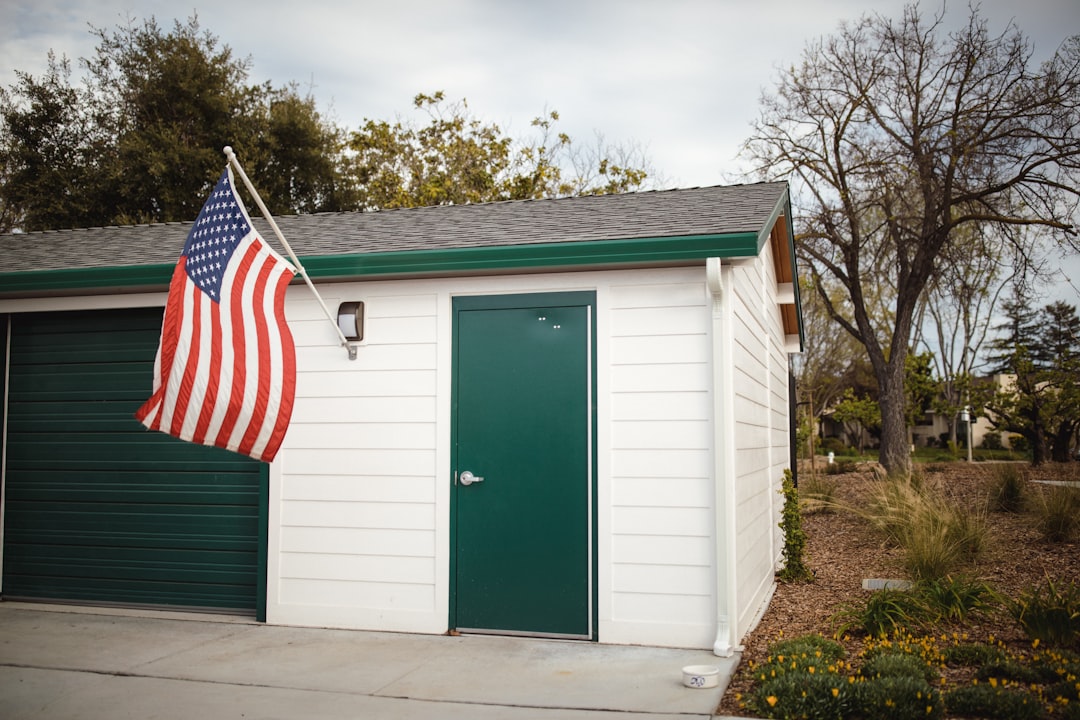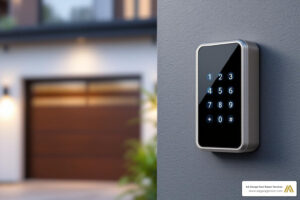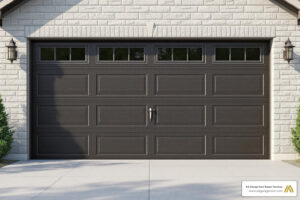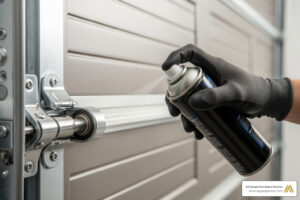Why Your Garage Door Needs Regular Attention
Do garage doors need maintenance? Absolutely. Your garage door is the largest moving part in your home, cycling up and down over 1,000 times a year. As the leading experts in garage door services in the Twin Cities, we know that like any mechanical system, it requires regular care to operate safely and reliably. Neglecting it is like skipping oil changes for your car—a gamble that can lead to costly and dangerous problems.
Quick Answer:
- Safety: Prevents accidents from component failures.
- Cost Savings: Stops minor issues from becoming expensive emergency repairs.
- Longevity: Extends door and opener lifespan from 10-15 years to 20+ years.
- Reliability: Ensures smooth operation in all weather.
The good news is that most maintenance is simple. Basic tasks like lubrication and visual inspections take just minutes, while annual professional garage door maintenance ensures complex components like high-tension springs stay safe and functional. Proper care prevents dangerous failures and saves homeowners significant money on repairs.
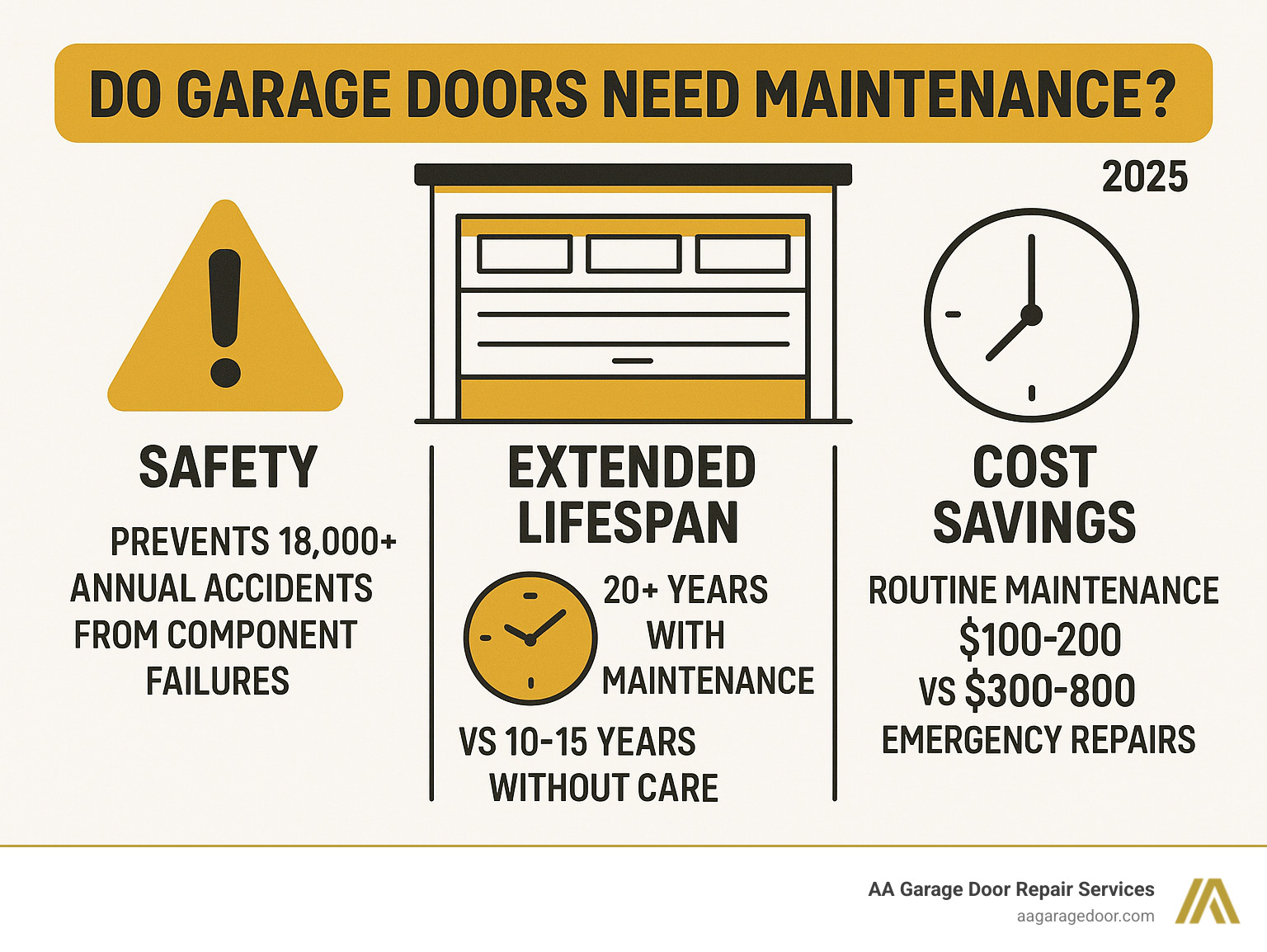
Why Regular Garage Door Maintenance is Non-Negotiable
Think about it – you wouldn’t skip oil changes for your car, so why neglect the largest moving part of your home? Do garage doors need maintenance? Absolutely, and ignoring it can be a costly and dangerous mistake. Your garage door is a complex system working under tremendous tension from springs holding hundreds of pounds of weight. When something goes wrong, it creates serious safety hazards.
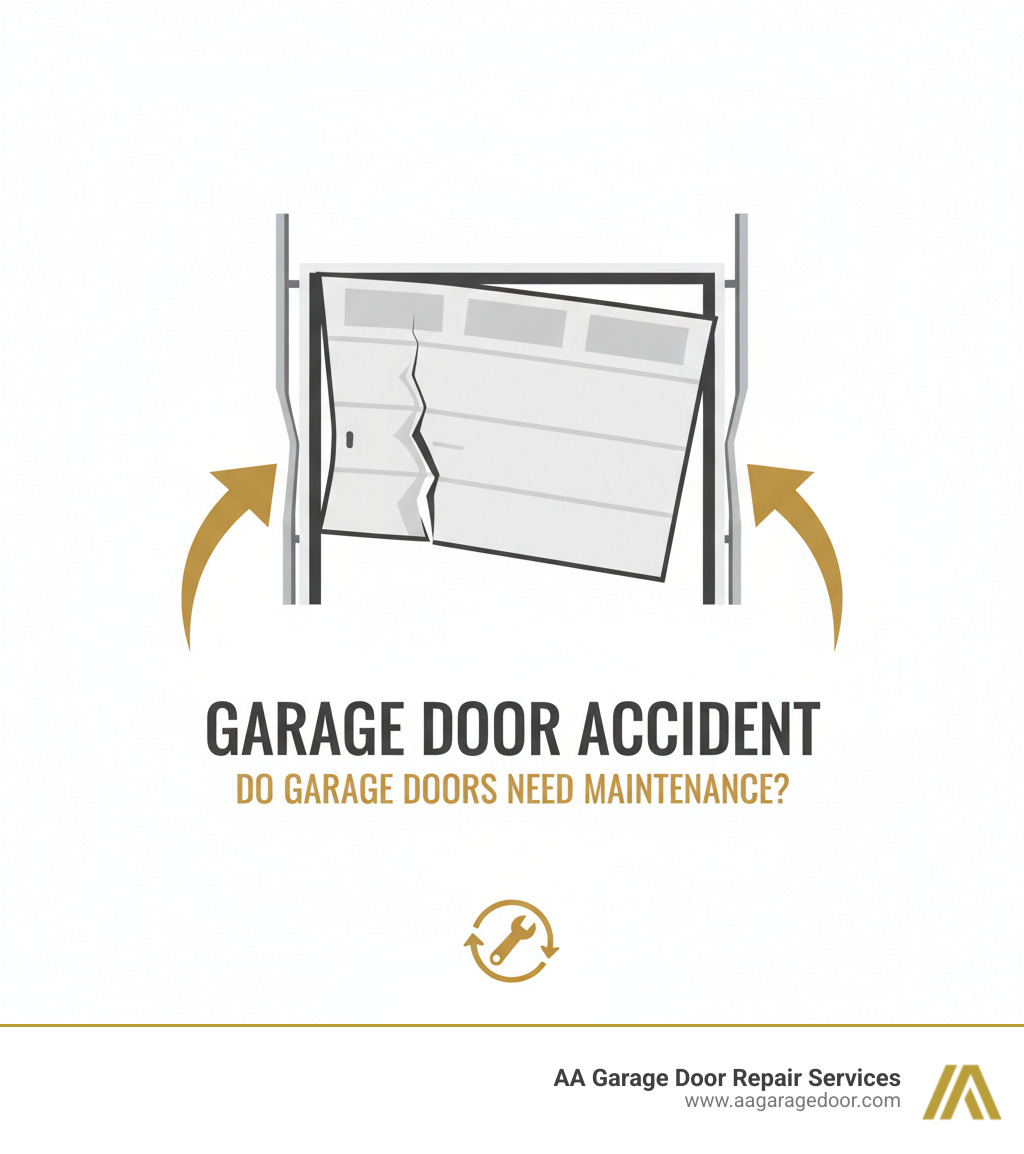
Garage door malfunctions cause thousands of preventable accidents each year. Considering your door cycles over 1,000 times annually, it’s easy to see how components wear down and safety features fail without regular attention.
The Critical Role of Safety
Your garage door’s safety features are only as reliable as their last inspection. Photoelectric sensors need regular cleaning to detect obstructions, and the auto-reverse feature requires calibration. The real danger lies in component failure. A snapping high-tension spring or cable can cause the 150-400 pound door to crash down without warning. The good news is that most safety issues are preventable. Our professional garage door maintenance includes comprehensive safety inspections for your peace of mind. For more on safety standards, the International Door Association is an excellent resource.
Extending the Life of Your Door and Opener
Did you know an unbalanced garage door can cut your opener’s lifespan in half? The motor works overtime to compensate, leading to premature burnout. Regular maintenance keeps everything running smoothly through lubrication, spring balancing, and track cleaning, all of which prevent significant wear and tear. A well-maintained system can last 20+ years, while neglected ones often fail within 10-15 years, a substantial difference for a major home investment. Our article on Pro Tips for Maintaining and Repairing Your Garage Door covers more on this.
Avoiding Costly Emergency Repairs
Most emergency repairs start as minor, ignored issues. A slight grinding noise might just need lubrication now, but could become damaged tracks later. A frayed cable is a small fix during routine maintenance but a costly emergency call when it snaps. Emergency repair costs are typically 2-3 times higher than preventive maintenance, with major failures like broken springs or motors costing $300-$800, while routine service is just $100-$200. Regular care also preserves your home’s curb appeal and value. For a cost breakdown, see our guide: Garage Door Repair Cost: What to Expect.
Your Essential Maintenance Checklist: DIY vs. Professional
Understanding the difference between safe DIY tasks and jobs for a professional is crucial for your safety and your door’s longevity. This section outlines what you can handle and when to call the experts.
| DIY Tasks | Professional Tasks |
|---|---|
| Visual Inspection (twice yearly) | Spring Adjustment/Replacement (high tension) |
| Lubrication (hinges, rollers, springs) | Cable Repair/Replacement (fraying, snapping) |
| Cleaning Tracks (remove debris) | Opener Motor Service (internal electrical) |
| Testing Sensors (photo eyes, auto-reverse) | Track Realignment (structural bends) |
| Tightening Hardware (bolts, screws) | Door Balance Adjustment (spring tension) |
| Cleaning Door Surface | Advanced Troubleshooting & Diagnostics |
Basic DIY Maintenance Homeowners Can Perform
These simple, effective tasks keep your garage door in good working order without specialized tools.
Here’s a simple monthly DIY checklist:
- Visual Inspection: Monthly, look for frayed cables, worn rollers, or cracked hinges. Watch the door’s movement—is it smooth or jerky?
- Listen for Noises: Grinding, squeaking, or popping sounds are warning signs. Squeaking often just needs lubrication.
- Tightening Hardware: Vibrations can loosen bolts. Periodically tighten roller brackets and bolts with a socket wrench.
- Lubricating Moving Parts: Twice a year, use a silicone-based lubricant or white lithium grease on rollers, hinges, and springs. Avoid WD-40, as it’s a solvent that can attract dirt.
- Cleaning Tracks: Use a damp cloth to clear dirt and debris from the tracks. Never lubricate the tracks themselves.
- Testing Safety Features:
- Auto-Reverse: Place a 2×4 flat on the ground in the door’s path. It should reverse on contact.
- Photo Eye Sensors: Wave an object through the sensor beam while the door is closing. It should stop and reverse. Clean the sensors if they fail the test. If it still fails, call a pro.
For more detailed DIY tips, read our article: 10 Garage Door Maintenance Tips.
When to Call a Professional Technician
Some components and issues are extremely dangerous and should always be left to experts.
- High-Tension Springs: Torsion and extension springs are under immense tension. Attempting to adjust or replace them without proper training and tools can be fatal. Any bolt painted red is a warning to stay away.
- Frayed or Snapped Cables: Like springs, cables are under high tension and can cause severe injury if they snap.
- Opener Electrical Issues: Beyond changing a light bulb, any work on the motor, circuit board, or wiring requires a professional to avoid shock or further damage.
- Door Off Track: This often signals a larger problem. Forcing the door back can cause more damage and is dangerous due to the door’s weight.
- Significant Damage: After an impact or from severe neglect, a professional should assess the door’s structural integrity.
When in doubt, it’s always safer to call a qualified technician. For more on this, check out 3 Garage Door Repairs Best Left for the Professionals.
Signs of Trouble: When Your Garage Door Needs Attention
Your garage door gives hints long before it breaks down. Recognizing these warning signs early can turn a major emergency repair into a simple fix. Waiting too long can turn a minor squeak into a $400 broken spring.
Unusual noises are the most common sign. Grinding or scraping often means worn rollers or dirty tracks. Squeaking is a call for lubrication. Pay close attention to popping sounds, as this can signal dangerous torsion spring problems that need immediate professional help.
Other red flags include slow response time from the opener, or jerky and uneven movement. Your door should glide smoothly. If it closes unevenly, leaves a gap, or feels heavy when manually operated, the spring system is likely unbalanced, putting extra strain on the opener.
For a complete list of warning signs, check out our guide: 10 Signs You Need to Get Your Garage Door Serviced.
What to Look for on Key Components
A monthly visual inspection can catch problems before they become dangerous.
- Springs: Look for visible gaps in the coils (a broken spring) or excessive rust. Never touch them.
- Cables: Inspect for fraying, broken strands, or rust. A frayed cable is a safety hazard that could snap at any moment.
- Rollers: Check for cracks, chips, or excessive wear. They should roll smoothly, not slide.
- Tracks: Look for bends, dents, or debris. Ensure they are securely mounted and aligned.
- Door Panels: Check for dents, cracks, or warping. On wood doors, look for rot; on steel doors, check for rust.
- Weather Seal: A cracked or brittle seal along the bottom of the door allows drafts, moisture, and pests into your garage.
Understanding these components helps you spot trouble early. For more technical details, This Old House offers excellent resources. The bottom line is that paying attention to these signs is a crucial part of your maintenance routine.
How Often Do Garage Doors Need Maintenance and What Does It Involve?
Do garage doors need maintenance on a regular schedule? Yes. A consistent routine is the best way to ensure your door operates safely and reliably for decades, preventing problems before they start.
A consistent schedule is the best way to ensure reliability and safety.
The Ideal Maintenance Schedule
The best approach combines DIY tasks with professional expertise.
- Monthly Visual Checks: Take a few minutes to look and listen for obvious signs of wear or damage.
- Quarterly Homeowner Tasks: Spend 15-20 minutes lubricating moving parts, cleaning tracks, and testing safety features.
- Annual Professional Inspection: This is the cornerstone of proper maintenance. A trained technician can spot subtle issues, check spring tension, and make adjustments that require specialized tools. For high-usage doors or homes in harsh climates like Minnesota, consider semi-annual service.
The Role of Lubrication and Weather
Proper lubrication is a critical DIY task. White lithium grease and silicone spray are best for reducing friction and protecting against rust. A common mistake is using WD-40. As The Natural Handyman explains, WD-40 is a solvent, not a lubricant, and can attract dirt and dry out parts over time. Apply lubricant sparingly to hinge pins and roller stems, but never lubricate the tracks, as this makes rollers slide instead of roll.
Minnesota winters are tough on garage doors. Extreme cold makes metal brittle and prone to failure. Temperature swings cause contraction and expansion, stressing all parts. Salt and moisture from roads accelerate rust on springs and cables. Our regional climate demands more attention, but with proper care, your door can handle it.
Frequently Asked Questions about Garage Door Upkeep
Here are answers to the most common questions we hear about garage door maintenance.
How much does professional garage door maintenance cost?
A comprehensive annual tune-up typically costs between $100 and $200. This small investment is incredibly valuable, as it can save you from emergency repairs costing hundreds more. A $150 maintenance visit could prevent a $600 spring replacement. Think of it as proactive care to avoid much higher costs later. For a detailed breakdown, see our guide on How Much Does Garage Door Maintenance Cost?.
What are the risks if I neglect to get the garage door maintenance it needs?
Neglecting maintenance is dangerous. The biggest risks include:
- Safety Hazards: A failing door can fall without warning, causing severe injury. Critical safety sensors can also stop working.
- Sudden Failure: Springs and cables under high tension can snap, making the door inoperable and hazardous.
- Increased Repair Costs: Minor issues escalate into major, expensive problems. An unbalanced door can burn out your opener motor years early.
- Voided Warranties: Most manufacturers require proof of regular maintenance to honor warranty claims.
- Reduced Home Security: A door that doesn’t close properly is an easy entry point for intruders.
Can I perform all garage door maintenance myself?
While we encourage homeowners to perform basic tasks, safety must always come first. You can handle visual inspections, cleaning, lubrication, and testing safety features. However, anything involving high-tension springs or cables is strictly for professionals. The risk of fatal injury is real. Likewise, any internal electrical work on the opener should be left to a trained technician to avoid shock and damage. If you’re ever unsure, it’s always safer to call a pro. For more on safe DIY tasks, read 6 Tips to Maintain Your Garage Door.
Conclusion: A Small Task for Big Peace of Mind
The answer to do garage doors need maintenance is an emphatic yes. Your garage door is a complex system that works hard every day. Regular maintenance isn’t an expense—it’s a smart investment in your home’s safety, security, and functionality. A few minutes of checks each month and an annual professional tune-up can prevent dangerous failures and help you avoid costly emergency repairs.
The peace of mind from knowing your door will work reliably, especially during a cold Minnesota morning, is invaluable. You’re not just protecting your wallet; you’re ensuring your door operates smoothly and safely for decades.
When was your last professional service? If you’ve noticed warning signs like unusual noises or jerky movement, or if it’s been over a year since your last inspection, it’s time to take action.
As your local experts serving the greater Twin Cities area since 2001, we at AA Garage Door understand the challenges our climate presents. We’ve built our reputation on fast, reliable service with transparent pricing. Don’t wait for a breakdown. Trust the professionals who have been keeping local garage doors running smoothly for over two decades. Schedule your professional garage door maintenance today.

